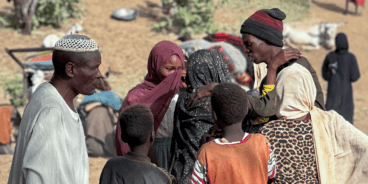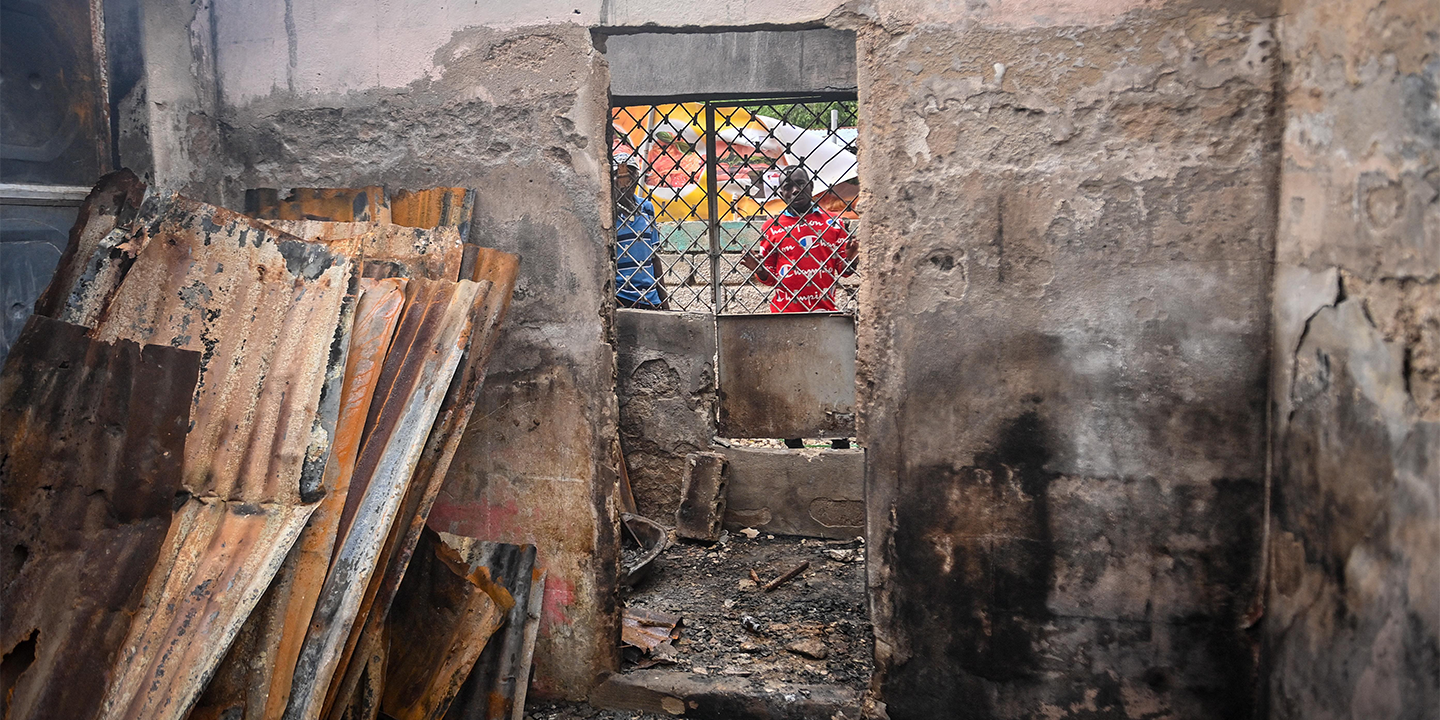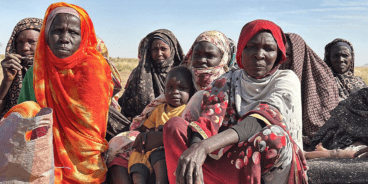

Atrocity Alert No. 379: Haiti, Sudan and Yemen
Atrocity Alert is a weekly publication by the Global Centre for the Responsibility to Protect highlighting situations where populations are at risk of, or are enduring, mass atrocity crimes.
COMMUNITIES UNDER SIEGE AS GANG VIOLENCE SURGES ACROSS PORT-AU-PRINCE, HAITI
Surging gang violence forced Port-au-Prince, the capital of Haiti, under lockdown on Thursday, 18 January. The once peaceful neighborhood of Solino was the epicenter of a multiday siege, during which dozens of people were killed while flaming barricades blocking streets and relentless automatic gunfire left residents trapped in their homes. Residents regularly called radio stations pleading for help. One unidentified caller said, “If police don’t come, we are dying today.” Four days into the siege, the Haitian National Police released a statement saying officers were deployed. The siege has raised fears of escalating violence that could spread further in Port-au-Prince, as Solino is strategically located near neighborhoods that have remained largely safe.
In recent months gangs have significantly expanded across the metropolitan area of Port-au-Prince and beyond to the Ouest (West) and Artibonite Departments, prompting new outbreaks of violence. Gangs control over 80 percent of Port-au-Prince. Last year the UN documented 4,789 people killed by gang violence, an increase of 119 percent compared with 2022, while another 3,000 people were kidnapped. According to local sources, kidnappings have been on the rise since the beginning of the year. Last week a doctor and a justice of the peace were kidnapped before being released on payment of a ransom. On 19 January armed gunmen stopped and boarded a bus in Port-au-Prince, kidnapping six nuns and two other passengers in broad daylight.
Jean-Martin Bauer, Acting UN Humanitarian Coordinator, warned, “Living in Haiti today means being forced to make impossible choices to stay alive. Going to school, the hospital or the market, cultivating your field or obtaining drinking water has become an ordeal for millions of Haitians. Because crossing the threshold of your house means risking death from bullets, being kidnapped by armed groups or suffering unimaginable violence of all kinds, including sexual violence.” The latest UN Secretary-General’s report on Haiti outlines how gangs systematically use sexual violence to consolidate control over populations, while the rape of hostages continues to be used as a tactic to coerce families into paying higher ransoms.
Amid the unprecedented gang violence, on 26 January Kenya’s High Court is expected to make a ruling on whether 1,000 Kenyan police officers can be deployed to Port-au-Prince, where they are expected to lead the UN Security Council (UNSC)-mandated Multinational Security Support Mission (MSS).
The deteriorating human rights and security situation in Haiti requires a swift and robust response by the international community. The MSS should be urgently deployed. The UNSC should update the list of individuals and entities subject to the sanctions regime for supporting, preparing, ordering or committing violations or abuses of International Human Rights Law, as well as fully implement the arms embargo.
UN REPORT DISCLOSES DETAILS OF “WORST VIOLENCE SINCE 2005” IN DARFUR
In a yet-to-be-released report, the UN Security Council (UNSC)-mandated Panel of Experts (PoE) on the Sudan reveals horrific accounts of violence against civilians in Darfur since the outbreak of the conflict in April 2023. The report, shared via several media outlets, describes how the Rapid Support Forces (RSF) and allied Arab militia perpetrated systematic violations of International Humanitarian Law, some of which may amount to war crimes and crimes against humanity. Violations included the indiscriminate use of heavy artillery and shelling in densely populated areas, torture, arbitrary arrests, conflict-related sexual violence and violations of child rights.
The fighting between the Sudanese Armed Forces (SAF) and the RSF has triggered an alarming escalation in ethnically motivated violence in various parts of Sudan. The PoE estimates that between 10,000 and 15,000 civilians were killed when the RSF and allied militia rampaged through El Geneina, West Darfur, from April to June. The violence fluctuated between large-scale and coordinated attacks employing heavy artillery in civilian neighborhoods, primarily targeting the Massalit community, and periods of relative calm during which the RSF resupplied, mobilized their forces and obstructed people’s movements. Those who tried to flee were stopped at checkpoints and harassed, robbed and assaulted. “Young men were particularly targeted and interrogated about their ethnicity. If identified as Masalit [Massalit], many were summarily executed with a shot to the head,” according to the report. During these attacks, the SAF largely remained confined within their barracks, failing to protect civilians.
The PoE is mandated to monitor the implementation of the sanctions regime in Sudan, including the arms embargo imposed by the UNSC on Darfur which aims to prevent states from supplying arms and related materiel. The PoE documented evidence of the RSF establishing new military supply lines through Chad, Libya and South Sudan, as well as “credible allegations” of regular rotations of cargo planes from Abu Dhabi International Airport to Amdjarass Airport in Chad, containing weapons, ammunition and medical equipment for the RSF. The United Arab Emirates has claimed that their support is for humanitarian purposes.
The UNSC, African Union and states with potential influence in Sudan failed to adequately respond to reports of ethnic cleansing in Darfur during May and June. It is long past due for the international community to devise an urgent strategy on how to effectively protect civilians in Darfur and elsewhere using all the instruments at its disposal, as well as assess the situation through the atrocity prevention lens. All UN member states must uphold the arms embargo and refrain from providing military supplies to the warring parties. UNSC members should publicly identify and call out those states violating the existing arms embargo and consider expanding the embargo to the rest of Sudan.
HUMAN RIGHTS AND HUMANITARIAN CRISIS ONGOING IN YEMEN AMID RED SEA ESCALATIONS
Since 19 November Houthi forces in Yemen have been attacking commercial vessels in the Red Sea, including firing missiles and drones, as well as arbitrarily detaining civilian crew members. In response, the United States and the United Kingdom, with support from other states, have launched airstrikes across multiple parts of Yemen since 9 January. In a resolution adopted on 10 January, the UN Security Council demanded Houthi forces immediately cease all attacks on merchant and commercial vessels and acknowledged the right of member states to defend their vessels from attacks in accordance with international law. According to Human Rights Watch, the Houthis have not presented any evidence to demonstrate that the targeted ships constituted legitimate military objects, and as such, the attacks are likely considered to be targeting of civilians and civilian objects, which may amount to a war crime.
UN Secretary-General António Guterres urged countries to prevent an escalation in the Red Sea and emphasized the need to “avoid acts that could further worsen the situation in Yemen itself,” calling for “every effort to be made to ensure that Yemen pursues a path towards peace and that the work undertaken thus far to end the conflict in Yemen should not be lost.”
While international attention has been focused on the Red Sea, the human rights and humanitarian crisis within Yemen continues. In Taizz, the Houthis prevent water from reaching civilians by blocking access to water basins and impeding entry of water trucks. The Houthis have also stopped water flows into Taizz City from two out of five of Taizz’s water basins. These and other siege tactics prevent essential resources and services from reaching Yemeni civilian populations.
Meanwhile, all parties to the conflict – including the Houthis, Southern Transitional Council, the government of Yemen and the Saudi/UAE-led coalition – continue to perpetrate human rights violations and abuses, including arbitrary detention, enforced disappearance and torture, as well as likely violations of International Humanitarian Law, including targeting of civilians and denial of humanitarian access. Although there has not been a significant escalation in hostilities following the expiration of a temporary truce in October 2022, at least 2,140 civilians have been killed or injured since then as occasional clashes continue across several governorates, including Al Bayda, Shabwah, Marib, Hodeidah and Taizz.
The international community should take steps to ensure that the current dynamics in the Red Sea do not detract from the need to address the ongoing crisis within Yemen. Yemeni civilians have endured likely war crimes and crimes against humanity since 2015 and urgently deserve peace and transitional justice, including reparations and redress.
Related Content


Joint Statement: Genocide Returns to Darfur
